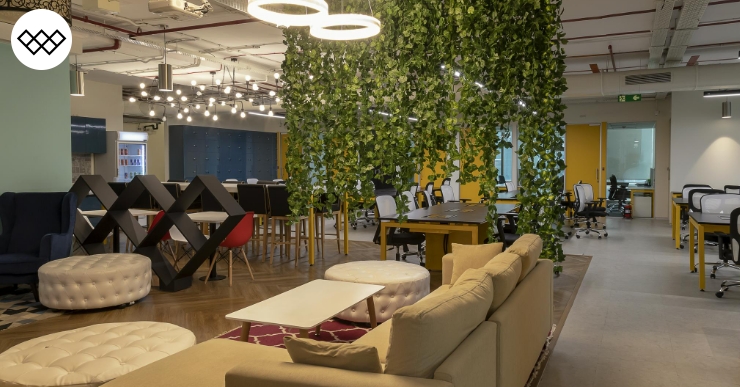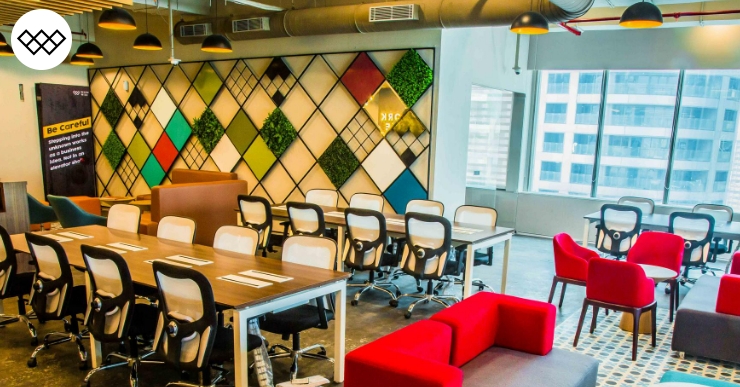
Just How ‘Collaborative’ Can Coworking Spaces Get?
When you need to innovate, you need collaboration.
– Marissa Mayer, Former president and CEO of Yahoo!
Collaboration is not a choice anymore. The ‘siloed’ approach to working will no longer yield the results companies are looking for. Collaboration allows for effective decision-making, and also encourages employees to learn from each other and solve problems.
Coworking spaces are pretty much redefining the concept of collaboration. Given their diversity and flexibility, coworking spaces are often referred to as the ‘workplaces of the future’. But, just how collaborative are the coworking spaces?
Let’s take a look…
Exploring The Collaborative Opportunities of Coworking Spaces
The primary reason why self-employed individuals and companies choose coworking areas is the affordability. Getting an independent office in densely populated metros like Mumbai can be quite a challenge. Given their flexibility (a healthy mix of open and private workspaces) and adaptability to all kinds of businesses, coworking spaces are increasingly preferred over the traditional office setups.
However, this is not the only motivator for businesses to flock to coworking spaces. We also need to focus on the more ‘inherent’ aspects of working in a space shared by different kinds of businesses – things that may not immediately come to mind.
1. Knowledge Exchange Like Never Before…
Access to knowledge, the most potent resource, is what fuels people to prefer a shared work area.
Coworking spaces offer a common platform for the Goliaths (read established corporations) to work cheek by jowl with the Davids (read: startups). The physical proximity creates several opportunities for both parties to communicate and form a community that can be mutually beneficial.
Corporate employees can exchange ideas with techpreneurs or freelancers can brainstorm with founders. The exchange of knowledge, and the tremendous scope for learning, are the highest forms of collaboration that coworking spaces offer.
2. Makes Problem-Solving Easier
Take any coworking space in Mumbai – you’ll find a heady amalgam of writers, marketing gurus, editors, finance experts, designers, HR specialists and many more. This diversity can help all the inhabitants of the coworking space find quicker solutions to their most pressing problems.
Let’s use an example to explain how:
You are a web content startup operating out of a coworking space in Lower Parel. Your business is creative by nature, which means you’ll be needing someone to design logos social posts, etc. Unfortunately, you don’t have a graphic designer on the payroll.
Fortunately, you know three graphic designers who work out of the same coworking space. What do you do? You go to one (or each) of them and ask if they’d be happy to pitch in. That’s right – you can source talent from right across the floor!
Working in a traditional setup, or from home, wouldn’t allow you this convenience of simply talking to someone on the floor, and finding an immediate solution. Either you’d have to disappoint the client or take the considerable effort of finding a graphic designer using the traditional channels.
Collaboration in shared working places ensures that there is never any need for external services. Most obstacles and hurdles are crossed using the people present within the space.
Encourages Cross-Business Partnerships
One of the greatest collaborative benefits of coworking spaces, is the opportunity to form cross-business partnerships. We’ll pick another instance to explain how.
A small fabric startup caters to a wide range of clients. One of those clients is a client of a furniture company that rents space in the same coworking area as the fabric business. When several customers of the furniture company ask them to offer a more comprehensive service, what do they do? They collaborate with fabric startup. While they toil on the design of tables and chairs, the fabric company works on furnishing them.
The proximity of the coworking community enables easy collaboration. When an issue crops us, instead of sending emails back and forth, they simply use the common areas to resolve it. More work gets done and at higher efficiency.
Startups Teaming Up With Bigger Companies
The ‘openness’ of coworking spaces allows for another possible collaboration that can open up new horizons – that between smaller enterprises and the behemoths of the corporate world. Such a partnership can either help the concerned parties find quicker solutions to their most pressing problems, or lead them into a whole segment that either hadn’t thought about earlier.
About five years back, IBM posed a question – “How can IBM engage deeply with startups?” The answer they got, from a coworking space founder, was, “be residents in startup communities (and) interact with startups on a daily basis in a shared physical space.”
In simpler words, one of the tech giants of the world was told to work in a coworking space so that they are closer to real-life startups. The result was IBM Garage. Generally, present in coworking areas, the Garages are a neutral space where IBM workers can ‘think design’ with their clients. Why did IBM take the step? Excluding other reasons, to be more collaborative.
Another example of the partnership of big firm with a startup is Bosch and 1871 that birthed a niche co-creation space dedicated to the Internet of Things called The Chicago Connectory.
Networking Is A Breeze In A ‘Collaborative’ Space…
Coworking spaces conduct events and workshops covering a range of topics, that every member can participate in. These events, and the inherent ‘openness’ of the space, allow for networking opportunities every day, unlike traditional workspaces.
The scope for building lasting and constructive relationships is far greater, given the physical proximity.
Working Alone, Yet Together
Collaboration isn’t a novel concept. It’s been around for centuries. And it has almost always given breathtaking results. It still takes rubbing shoulders with the unlikeliest of people to form partnerships and create breakthroughs.
In all these instances, a neutral setting is pivotal – a common ground that encourages communication and corroboration. Coworking spaces offer precisely that – an environment that spurs collaboration, and hence commercial growth.
There are endless ways shared workplaces help individuals, freelancers, budding entrepreneurs, and corporations to band together. From working unitedly on a single project to a more long-term relationship, the mode and time may differ, but the outcome is continuously the same.
When members of a coworking community come together, the result is always greater than the sum of their parts.
If you are looking for a coworking space that balances collaborative and private spaces, WorkWise is just the thing for you! For coworking spaces in Andheri, Vashi, and Lower Parel, get in touch with us!





Pingback: Why Coffee Is The 'Magic Bean Juice' That Your Workplace Needs! - WorkWise